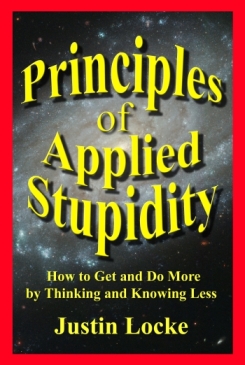Being the #1 (self appointed) expert in the universe on Stupidity, I have of course dealt with failure in past books and blogs. But, since stupidity is of course infinite, I never stop discovering new realms of it, and recently when pondering all the many hits on my blog entries re: fear of failure, I decided to delve further into the working and physics of failure, and I was quite surprised to discover this astonishing fact: failure does not exist.
I know this may sound odd, but to buttress my point, let me make you this offer: for every pound of failure you box up and ship to my house, I will give you $50. Of course, we both have to agree that what you have shipped is failure, otherwise I will ship whatever you sent me back to you with a hefty processing and return postage fee. And you must be cautious, because what you call failure I could easily label as “a wonderful learning experience.”
And that sums it up. Since you cannot prove that anything is a failure outside of it being such in your opinion, it has no independent existence. Like hope or excellence (two other words I have pointed out the meaninglessness of in past blogs), failure is a fantasy, an opinion, a feeling– it has no substance, mass, volume, or atomic weight. Therefore it does not exist.
So what is it? For failure to exist as theoretical concept, there has to be an arbitrary standard (which also has no substance) against which a current activity is to be negatively judged. “We failed to get to the school on time.” “We failed to get more than 70 on the test.” “You failed to buy 10 copies of my book.” You see, without the imposition of an arbitrary limit or standard, there can be no failure. And since the arbitrary standard can be easily changed, the failure can be easily changed as well. The belief in the importance in the arbitrary standard is the only basis for proving the existence of failure. Since arbitrary standards can change at a drop of a hat, again, there is no substantive proof that failure exists.
Now of course a lot of people are still afraid of failure, so let’s delve a little deeper. What failure really consists of is a theoretical state of total disconnection. Since that is more frightening than just about anything, as long as people believe it exists, that fear becomes a very handy tool for motivating people to do things they would rather not do. “If you don’t do this unpleasant thing– a much larger unpleasantness– failure (total emotional oblivion) will be visited upon your soul.”
One of the problems of using fear of failure for academic motivation is that, for kids at the bottom end of the academic spectrum, they quickly learn that getting an “F” has little of the threatened impact on the order of picking sides for softball. The implied emotional oblivion never materializes. So they lose the motivation of blind unthinking failure avoidance, at which point the whole system falls apart for them.
So from this we learn that it’s important that “failure” can NOT be anything of substance, for if enough people ever actually experienced it, it would lose its power of creating immense fear. So we don’t let people fail in school, instead we give “incompletes.”
I understand now why I was never allowed to actually experience failure in school, as my fear of it was a great source of motivation. Once I experienced actual "failure" (that is to say, a state of falling short of what i thought I had to do and be in order to be acceptable to myself and others), I realized it wasn't as horrific as I had imagined it to be, and so I started to think much more calmly. It was a lot harder to get me to panic, therefore much harder to manipulate my thinking and actions.
Now given that it does not exist, why does our belief in it continue? Well, truth is, we often use failure, not as motivation, but as a very handy tool of denying something even more unpleasant. For example, I might say, “I failed to get into medical school, and that’s why my mother doesn’t love me.” By saying something like this, I can overlay a sense of logic, order, and control over something unbearable that I cannot control. (Believe me, in this case, mom wouldn’t love me even if I DID get into medical school, but this rationale of blaming MY “failure” makes the situation bearable and offers a slim hope of resolution.) A little failure in one spot is a handy way of avoiding an unbearable failure in another spot.

I’m getting way too deep here in Alice Miller land, but it’s blog not a book so I hope you will bear with me.
But again, I still say, failure, as in having direct experience in what does not work, is a good thing. Failure is a great teacher, as it exposes the truth. Those truths aren’t always pleasant on first encounter, but ultimately they always make life better. A “failure” to achieve a goal may tell you that you lacked the necessary desire in the first place, or it may eliminate a blind alley, or it may lead you to an alternate plan. But fear of failure is nonsense. Failure is nothing more than a theoretical concept. Failure does not exist.
© Justin Locke
